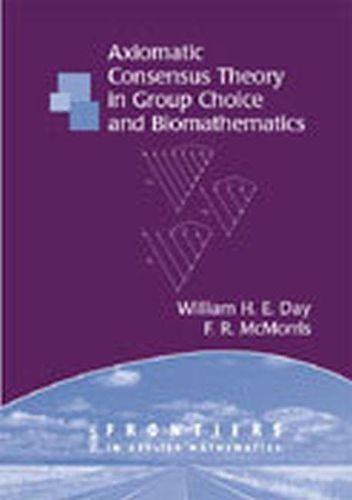Readings Newsletter
Become a Readings Member to make your shopping experience even easier.
Sign in or sign up for free!
You’re not far away from qualifying for FREE standard shipping within Australia
You’ve qualified for FREE standard shipping within Australia
The cart is loading…






Bioconsensus is a rapidly evolving scientific field in which consensus methods, often developed for use in social choice theory, are adapted for such areas of the biological sciences as taxonomy, systematics, and evolutionary and molecular biology. Typically, after several alternatives are produced using different data sets, methods or algorithms, one needs to find a consensus solution. The axiomatic approach of this book explores the existence or nonexistence of consensus rules that satisfy particular sets of desirable well-defined properties. The axiomatic research reviewed here focuses first on the area of group choice, then in areas of biomathematics where the objects of interest represent partitions of a set, hierarchical structures, phylogenetic trees, or molecular sequences. Axiomatic Consensus Theory in Group Choice and Biomathematics provides a unique comprehensive review of axiomatic consensus theory in biomathematics as it has developed over the past 30 years. Established here are the theoryOs basic results using standard terminology and notation and with uniform attention to rigor and detail. This book cites both traditional and current literature and poses open problems that remain to be solved. The bibliographic notes in each chapter place the described work within a general context while providing useful pointers to relevant research. The bibliographic references are a valuable resource for both students and experts in the field.
$9.00 standard shipping within Australia
FREE standard shipping within Australia for orders over $100.00
Express & International shipping calculated at checkout
Bioconsensus is a rapidly evolving scientific field in which consensus methods, often developed for use in social choice theory, are adapted for such areas of the biological sciences as taxonomy, systematics, and evolutionary and molecular biology. Typically, after several alternatives are produced using different data sets, methods or algorithms, one needs to find a consensus solution. The axiomatic approach of this book explores the existence or nonexistence of consensus rules that satisfy particular sets of desirable well-defined properties. The axiomatic research reviewed here focuses first on the area of group choice, then in areas of biomathematics where the objects of interest represent partitions of a set, hierarchical structures, phylogenetic trees, or molecular sequences. Axiomatic Consensus Theory in Group Choice and Biomathematics provides a unique comprehensive review of axiomatic consensus theory in biomathematics as it has developed over the past 30 years. Established here are the theoryOs basic results using standard terminology and notation and with uniform attention to rigor and detail. This book cites both traditional and current literature and poses open problems that remain to be solved. The bibliographic notes in each chapter place the described work within a general context while providing useful pointers to relevant research. The bibliographic references are a valuable resource for both students and experts in the field.